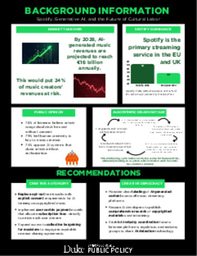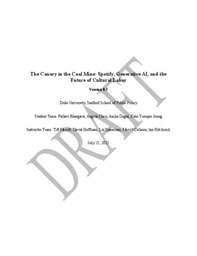International Blog 2025: Music & AI in Brussels and Oxford
I spent my Laidlaw research summer abroad in Brussels, Belgium and Oxford, England, as a part of the Platform Accountability Tech Policy research track of the Duke Laidlaw program. Along with three other classmates, we began our research adventure focusing on Spotify as a case study for the impact of generative AI on the creative industries, namely when AI models train on human, copyrighted work– such as songs– in order to produce AI-generated songs that then potentially outcompete the original human ones. We shaped our research based on our experiences, arriving with no finalized research question, instead just an airbnb in Etterbeek, Brussels, a severe lack of French, and our awesome Professor and Grad Student research instructors. We hit the ground running: 9am meeting with the US Embassy on Day 1, which set the tone for the rest of the trip.
Our daily structure in Belgium was essentially 1-3 meetings a day with various policy, government, tech, and music organizations, then a team debrief meeting to assess the stages of the white paper, the medium of deliverable we had chosen, before dispersing to independently work. The meetings were without a doubt the coolest part of the experience. European work culture is so different from America’s – it is a lot more casual, and at the same time, it felt like a tight-knit family where everyone we met with closely knew other contacts in the space they wanted to refer us to. I learned a lot about how to carry myself professionally, but also socially: I found the people who were the most successful were the ones who could connect with people most on a fundamentally human, social level – not the ones who prioritized work and achievement over everything.
These were the kind of leaders I began to aspire towards becoming. People who saw leadership not as a transactional power, but as a transformational and connecting one. Connecting with people is what sets the foundation to be able to discuss the tougher pills to swallow. Small talk is important at the beginning of a meeting. The world will not end if the meeting agenda is not executed to a perfect-tee. And the saying is true: Americans live to work, and Europeans work to live.
My favorite meeting was with the Chief Information Officer of NATO and his team. We spent the day at the NATO headquarters in Brussels, asking questions about technology policy, but also about life. I felt a buzz of energy that has stuck with me ever since. NATO felt like the public sector and the private sector had a baby who was focused on foreign defense. But you could also feel that NATO as an organization had such a strong sense of self: every member entered the building by walking past a piece of shrapnel from the 9/11 twin towers attacks. It is a reminder – and anyone ranging from the warm woman at the reception desk to the CIO himself will tell you this– that every day at NATO is a day that protects the freedom of millions of people. Pretty epic.
I also learned how important and valuable it is to talk to people who don’t work in the fields you want (or think you want) to be in. For example, our research was on Music and Technology policy, so a meeting with NATO might seem random. But it was in these meetings with NATO that we were all pushed to think critically about what we actually want out of life– if we are on a conveyor belt of Duke’s preprofessional options, which of course all have their own merits, or if we are “treating our education like tapas,” as our Professor always encourages, and trying out different things to figure out what we really want.
All the while, we were attempting to write a long, dense, and difficult – albeit super interesting –white paper. We spent hours working until 2 or 3 am many weeknights, trying to gain a deep dive understanding of copyright, intellectual property, and data privacy law in both the EU and the UK. On the weekends, we day-tripped to local Belgian cities like Bruges and Antwerp, the latter being the result of getting on the wrong train, and we experienced the ups and downs of working as a team. By week 3, it became evident that we had been too siloed– dividing the work up between the four of us and working independently on our sections wasn’t working. We reached an inflection point: our first draft was bad. Not just bad, but unusable. It was disheartening to see how our work had gone down such a different path than the goals we had initially set out. But after a brief moment of processing, we regrouped, met as a team, set new expectations for each other, and we tried again. I felt myself grow as a leader in more clearly communicating to the team what quality of work I thought we were capable of, and in regrouping to make a new plan to reach that quality.
And after two all-nighters and a lot of coffee, we got it done. We became more resilient and adaptable as a team, a critical skill when attempting something new and difficult.
As the amazing meetings continued, such as a meeting and dinner with Universal Music Group, where we learned how artists get “broke” (meaning become famous), and about some fascinating AI technology being embraced in the music sector, we reached another crossroads. I began to wonder if our research questions were too one-sided – we had spent the duration of the summer composing a research report detailing the negative effects of AI in the music industry, but what about the positive ones?
It is here where my next major lesson occurred: our research could conclude in positive and negative effects, not just or, but it’s not always possible to cover both. We should aim to be reliable narrators – in this day and age you can’t make an absolute bold face negative claim on AI– but should take the pressure off of ourselves to cover every single perspective possible in this research paper. The best research seemed to be the kind that had enough depth in the area pertaining to the question, and enough breadth to contextualize it, without burying the lead in background information. As we met with more people, we found that there had to be an acknowledgement of both the positive and negative effects of AI to be taken seriously. So we continued on, and our paper started to come together. We then departed for Paris, France, for the short second leg of our trip.
In Paris, we had the opportunity to meet with the OECD, which was amazing. We were also there for the city-wide ‘Fete de la Musique.’ Fete de la Musique was one of the coolest things I have ever experienced, and it made me want to create something similar at Duke. I would best describe it as a day when the entire city of Paris lights up with music. It’s a music festival, but not in the typical sense: every street, every riverbank, every theater, every club, has music. Not just music, but live music, live performers, and people dancing, singing, and just enjoying the music as a result. Festival sounds too underwhelming and commercialized to describe it. It was more like a city wide holiday. I grew up singing. Music is a huge part of who I am. So to be in Paris, a beautiful, fairytale city, during the most musical day of the year, while researching Music and AI, was definitely a day for my personal history book.
After Paris, we trained straight to Oxford, England, where we prepared to present our research at the Rothermere American Institute. We worked for 15 hours straight upon landing. I remember thinking everyone in Oxford looked “smart and scruffy.” Still true. Lots of facial hair and glasses. Also lots of 1000 year old buildings and some pretty brilliant people.
The research presentation was initially daunting, but ended strongly. We got so many questions within the first two slides of the presentation that we had to switch gears of formatting for the latter half, on the fly, to make sure the presentation could finish. We had stakeholders from a variety of different sectors – anyone ranging from musicians, to DailyMail representatives, to tech CEOs, to members of the UK government. Their opinions on AI differed, but the sentiment across their thoughts was unanimous: this is what we need to be talking about. And it needs to be bigger than musicians, because it will hit everyone.
This experience was one of the most rewarding and also difficult working experiences I have ever been a part of. I am so grateful to have done it, and I also don’t know if I could ever do it at that pace again. But there is something incredibly valuable about an experience that pushes you to your limit, especially in a foreign country. The biggest safety net you have abroad is yourself. And learning how to get yourself out of moments of stress or anxiety when you are surrounded by the largely unknown is an amazing skill to have.
Besides the research, my international takeaways from Brussels and Oxford were as follows:
- Go to every park you find
- Bring a journal or a notebook and a pen everywhere you can
- Ordering coffee abroad is really hard
- I still LOVE coffee and it is worth embarrassing myself to order
- Walk everywhere
- Carve out solo time for yourself even when on a group trip
- Music is a universal language
I am leaving this summer feeling a level of motivation and professional vision for myself that I haven’t felt before. I was genuinely so inspired by the research and findings of this summer that it doesn’t matter how stressful the experience was at times– I am so excited to return to Duke and get to work on implementing new ideas that have come from this summer. I hope wherever I end up in the future is somewhere that has that strong, NATO-like, sense of self and community. I feel intellectually on fire. And I have the Laidlaw Foundation & my Duke teammates to thank for it!


Please sign in
If you are a registered user on Laidlaw Scholars Network, please sign in